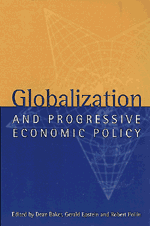Book contents
- Frontmatter
- Contents
- List of figures
- List of tables
- List of contributors
- Editors' acknowledgments
- 1 Introduction
- I The IMF, the World Bank, and neo-liberalism
- II Foreign direct investment, globalization, and neo-liberalism
- 4 Globalization, transnational corporations, and economic development: can the developing countries pursue strategic industrial policy in a globalizing world economy?
- Comment by Tamim Bayoumi
- 5 Multinational corporations in the neo-liberal regime
- Comment by Tim Koechlin
- III Globalization of finance
- IV Trade, wages and the environment: North and South
- V Migration of people in a global economy
- VI Globalization and macroeconomic policy
- Bibliography
- Index
5 - Multinational corporations in the neo-liberal regime
Published online by Cambridge University Press: 04 August 2010
- Frontmatter
- Contents
- List of figures
- List of tables
- List of contributors
- Editors' acknowledgments
- 1 Introduction
- I The IMF, the World Bank, and neo-liberalism
- II Foreign direct investment, globalization, and neo-liberalism
- 4 Globalization, transnational corporations, and economic development: can the developing countries pursue strategic industrial policy in a globalizing world economy?
- Comment by Tamim Bayoumi
- 5 Multinational corporations in the neo-liberal regime
- Comment by Tim Koechlin
- III Globalization of finance
- IV Trade, wages and the environment: North and South
- V Migration of people in a global economy
- VI Globalization and macroeconomic policy
- Bibliography
- Index
Summary
Introduction
The left's concern with globalization is, of course, nothing new. Marx wondered whether the process of globalization would crush incipient revolution in his “small corner of the planet.” And today, we ponder whether the recent acceleration of globalization will crush all national prospects for egalitarian and sustainable development. Yet, despite a good deal of hand wringing, discussion, and research, we are still quite far from understanding the implications of this much-discussed phenomenon for the lives of people, communities, and nations around the globe.
Here we look at one aspect of globalization: the role of multinational corporations (MNCs) and foreign direct investment (FDI). What has been the effect of MNCs and FDI on wage stagnation, inequality, and unemployment? More generally, what do future trends hold for the long-run impact of MNCs on our standard of living? We identify five views of the likely effect of MNCs on the trajectory of the world economy.
The first is “the race to the bottom” (Bluestone and Harrison 1982; Barnet and Cavanagh 1994; Greider 1997). According to this view, capital will increasingly be able to play workers, communities, and nations off against one another as they demand tax, regulation, and wage concessions while threatening to move. According to this view, increased mobility of MNCs benefits capital while workers and communities lose. A modified version is that the winners in the race to the bottom will include highly educated (or skilled) workers, or workers in particular MNC rentappropriating professions (e.g., lawyers and investment bankers), along with the capitalists; the losers will be unskilled workers and the unemployed.
- Type
- Chapter
- Information
- Globalization and Progressive Economic Policy , pp. 117 - 143Publisher: Cambridge University PressPrint publication year: 1998
- 26
- Cited by



